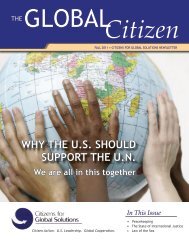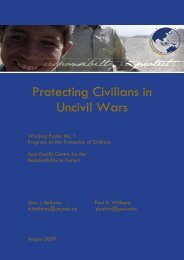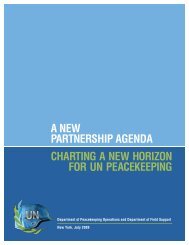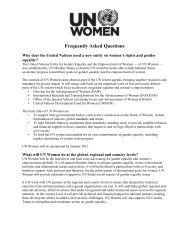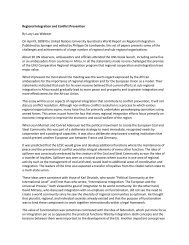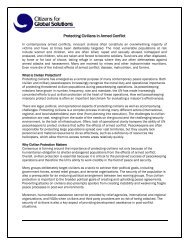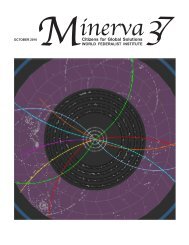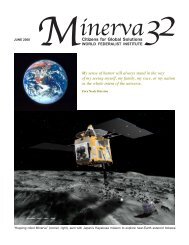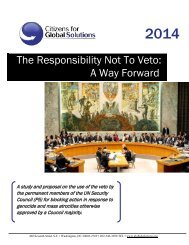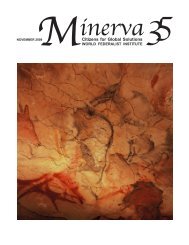Minerva, Fall 2011 - Citizens for Global Solutions
Minerva, Fall 2011 - Citizens for Global Solutions
Minerva, Fall 2011 - Citizens for Global Solutions
- No tags were found...
Create successful ePaper yourself
Turn your PDF publications into a flip-book with our unique Google optimized e-Paper software.
RS: The Permanent Forum and the <strong>for</strong>merWorking Group on Indigenous Populationsof the UN Human Rights Commissionboth provide opportunities toIndigenous Peoples to present their caseto an international human rights body.Although not structured as <strong>for</strong>mal truthcommissions, these two spaces at the UNallow Indigenous Peoples from all overthe world to draw attention to their plight,and they also give state representativesthe opportunity to respond.These public dialogues in Geneva andNew York have helped heighten worldawareness of these issues, and their ef<strong>for</strong>tsresulted in the adoption of the UNDeclaration on the Rights of IndigenousPeoples in 2007. However, being internationalbodies, they cannot pursue particularcountry situations beyond a certainpoint, and there<strong>for</strong>e their specific impactis limited.JR: Where has transitional justice failedIndigenous rights? What can be adaptedin the way truth commissions, specifically,have been approached in the pastto make them better reflect the specificrights and goals of Indigenous groups?RS: Up to now, the work of truth commissionsfocused specifically on the rights ofIndigenous Peoples has not had, in myopinion, a particular impact on transitionaljustice <strong>for</strong> these peoples. In somecountries, an independent judiciary canconceivably follow up on recommendationsmade by such bodies, but progresshas been slow and piecemeal. For example,several years ago the Canadianfederal parliament carried out an extensivecommission of inquiry on the situationof Aboriginal people that presentedimportant findings and recommendationsthat were not immediately acted upon bythe federal authorities. Only years laterhas another commission of inquiry comeinto existence to deal with the outstandingissue of the victims of the Indigenousresidential schools. And Canada is, up toa point, a model of justice <strong>for</strong> IndigenousPeoples, when compared to other countriesin the world.JR: Does transitional justice reflect an Indigenousapproach to justice?RS: Yes, I think it does, although it isdifficult to obtain consensus around thispoint. Certainly the acknowledgement bya modern state of historical harm done toIndigenous Peoples is considered by Indigenousorganizations as a necessary stepto move <strong>for</strong>ward. The next issue raises theproblem of reparations and compensation,which has become a very controversialpolitical issue in many countries, particularlywhen Indigenous territories are involved.Domestic judiciaries are usuallynot yet sufficiently prepared to deal withthese issues.JR: How can Indigenous Peoples find theterrain to start a process like a truth commissionwhen it seems there is no politicalwill to look at past and ongoing crimes?RS: It is easier <strong>for</strong> Indigenous Peoples toobtain access to a justice-seeking process,at least in Latin America, after a regimechange (such as the post-Pinochet-dictatorshipdemocratic transition in Chile)than in a state during a period of stablegovernance. Political will must be generated,and there<strong>for</strong>e a strong Indigenoussocial movement would be a plus to startsuch a process. When land ownership ispart of the problem, then strong privateeconomic interests make it very difficult<strong>for</strong> Indigenous communities to obtainjustice, particularly when there has beenlittle or no progress in the passing of adequatelegislation.JR: No one has a broader and betterknowledge of the status of Indigenousrights globally than you do: Do you haveanything to add regarding the value andthe possible risks of truth-seeking ef<strong>for</strong>tsinvolving indigenous rights work?RS: Truth-seeking ef<strong>for</strong>ts must be firmlygrounded in political support nationwideand, if possible, in strong legislation. Themedia must help in getting widespreadpublic support <strong>for</strong> such ef<strong>for</strong>ts. Professionalassociations (lawyers, environmentalists,educationalists, anthropologists,etc.) must also be enlisted. Politicalparties must be persuaded to support suchef<strong>for</strong>ts. Whenever possible, strategic litigationshould be undertaken to pave theway <strong>for</strong> further judicial involvement.International organizations (the UN, theInter-American system, the EuropeanUnion, the African Commission of Humanand Peoples Rights) must continueto work closely with Indigenous Peoplesand the international human rights organizations.A possible risk is that truth commissions,once established, have a relatively short“shelf-life” and can be used to distractpublic attention from more persistent involvementby legislatures, courts, executivetask <strong>for</strong>ces, or political campaigns.The commissions themselves must includefollow-up procedures in their recommendations,including time-tables andevaluation processes.ïJames Anaya, now in his 2nd term (until May 2014) as Special Rapporteur on theRights of Indigenous Peoples, has released his annual report on communications withgovernments concerning 25 cases of specific violations of human rights of IndigenousPeoples in 15 countries — including, in some cases, detailed observations with specificrecommendations or descriptions of follow-up measures he has taken (Cultural Survival,2 September <strong>2011</strong>). See page 59 <strong>for</strong> news of his later report to the UN.See also <strong>Minerva</strong> #30 (May 2006) <strong>for</strong> James Anaya’s essay on “The Current State ofInternational Law (& Indigenous Peoples)”.“Maori wisdom puts it best: He waka ekenoa – we are all in this canoe together,”Secretary-General Ban Ki-moon said atAuckland University in New Zealand on6 September, noting that there is no optoutclause <strong>for</strong> global problem-solving. “Inother words, we must unite and squarelyface the anxieties and the opportunities ofthe 21st century.”21 • <strong>Minerva</strong> #39 • November <strong>2011</strong>



